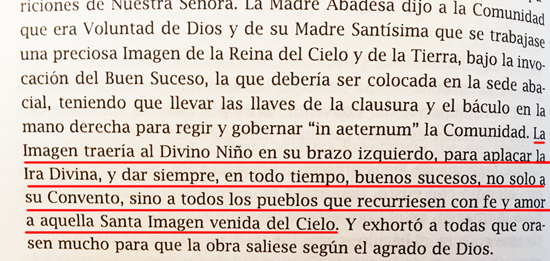Traditionalist Issues
 |
 |
 |
 |
 |
 |
 |
‘Good Success’ vs Good Event
Since 1999, TIA has promoted the devotion to Our Lady of Good Success in the United States.
The American branch of SSPX has been fighting the word success in the title Our Lady of Good Success since that time.
Their pretext for these attacks is that good success sounds too money-related, like a kind of happy financial venture. What is interesting to me is that these same people who complain that success sounds too money-related also happened to be the first ones to suggest the title Our Lady of Good Fortune...
TIA has exposed and explained SSPX’s suspect work in the Convent of the Immaculate Conception in Quito. Its agent pressured the non-English-speaking Mothers to sign a document saying that good success is not the best translation in English of the Spanish title Nuestra Señora del Buen Suceso (see here and here).
 The latest attacks have been spearheaded by the non-Spanish-speaking priest Fr. Adam Purdy (see his confession
here at the 17:00 minute mark), by means of the YouTube Channel Vox Catholica, a
veiled SSPX propaganda organ. Some other traditionalist groups linked to SSPX promoting its agenda include
Pro Multis Media,
Return to Tradition, and
JMJ HF Productions.
The latest attacks have been spearheaded by the non-Spanish-speaking priest Fr. Adam Purdy (see his confession
here at the 17:00 minute mark), by means of the YouTube Channel Vox Catholica, a
veiled SSPX propaganda organ. Some other traditionalist groups linked to SSPX promoting its agenda include
Pro Multis Media,
Return to Tradition, and
JMJ HF Productions.
Dictionary research
Since Spanish is my second language, I decided to research the words suceso and success, and found some authoritative dictionaries on this matter. Below are the results, which I will present in the form of objections and answers.
At the end of my article I will present a text from the book Admirable Life of Mother Mariana that seems to me the final word on the matter.
1st Objection: The expression buen suceso in Spanish does not translate well to good success in English. The term success is not habitual in English to express the same idea of suceso in Spanish. Its proper translation to English is event.
Answer:
Thesis: The term suceso in Spanish, anciently spelled sucesso, is translated in English properly by success according to old and new dictionaries, which are reproduced below:
Demonstration:
1. Spanish-English Dictionary (Piestre: London, 1786 - here)
Sucesso = success, event, accident, chance.

According to this dictionary of 1786, the first meaning of sucesso in Spanish is success in English. Event appears as its second meaning. Please note that in old English often the “s” is written as “ſ” as in this text.
2. New Portable Spanish-English Dictionary (Bossange, Masson y Besson, 1803 – here)
Suceso = success

This dictionary of 1803 gives only one translation for the Spanish suceso, which is success in English.
3. Handy Spanish-English and English-Spanish Dictionary (Hinds, Hayden & Eldredge, Inc., 1912 – here)
Suceso – success.

Again, this dictionary of 1912 gives only one meaning for suceso in Spanish, the English word success.
4. Lippincott’s Spanish-English English-Spanish Dictionary (J. P. Lippincott, 1916 – here)
Suceso – success, issue, result; event, incident.

In this dictionary of 1916 the first meaning for the Spanish suceso is success in English, the term event appears only as its fourth meaning.
Conclusion: According to four Spanish to English dictionaries from different times, the term success in English perfectly translates the Spanish concept of suceso. It is the first meaning of the word in English, more usual that the term event.
Therefore, the term success in English is the appropriate translation for suceso in Spanish.
Further, the sequence of dates of these dictionaries shows that success has been habitually used for a long time in English with this same meaning.
The ‘money oriented’ argument
2nd Objection: The term success in English is related to success in business and, therefore, has a pecuniary tone that is not proper to a devotion to Our Lady.
Answer:
Thesis: The term success in English is primary related to the result, outcome, termination of any affair, which is not necessarily financial.
Demonstration:
1. It is interesting to note that in the last dictionary quoted answering the previous objection, success in English is synonymous with issue, result, exactly the same meaning of suceso in Spanish when applied to Nuestra Señora del Buen Suceso.
The word event instead is synonymous to incident, a word hardily able to replace suceso in the title of that devotion.
None of the meanings in this dictionary implies that success in English is exclusively linked to financial issues; instead it is linked to any issue, which could apply also to the happy parturition of a mother.
2. The Dictionary of the English Language (Samuel Johnson. George Cowie and Co: London, 1828 – here)
Success, The termination of any affair happy or unhappy. Success without any epithet is commonly taken for good success.

This dictionary of 1828 confirms that in English success has the meaning of “the termination of any affair” without any specification that it must be a financial affair.
3. Online Etymology Dictionary – here.
Success. 1530s, “result, outcome,” from Latin successus “an advance, a coming up; a good result, happy outcome,” noun use of past participle of succedere, “come after, follow after; go near to; come under; take the place of,” also “go from under, mount up, ascend,” hence “get on well, prosper, be victorious,” from sub “next to, after” (see sub) + cedere “go, move” (from PIE root *ked- “to go, yield”). Meaning “accomplishment of desired end” (good success) first recorded 1580s. Meaning “a thing or person which succeeds,” especially in public, gis from 1882.

Quite interestingly this dictionary elaborates a lot on the meanings of result, outcome, which confirm the answer to the 1st Objection. It is only later on that it mentions to prosper, be victorious, which could be applied to success in financial business, although this dictionary does not mention this pecuniary aspect.
This entry on success shows that the expression good success was first recorded in the 1580s, attesting to the historicity of good success. Since the apparition of Our Lady of Good Success – both the discovery of the statue in a cave in Spain and the apparitions to Mother Mariana in Ecuador – were in the 1500s, it is easy to see that not long after the apparitions the expression good success was already introduced in the English language.
4. Good Success Bay – here
Another collateral proof that success in English is not necessarily used to express financial profits is a historical fact that happened in Argentina.
Bahía Buen Suceso is a small bay in the Tierra del Fuego Province. It was actually named after Our Lady of Good Success (Nuestra Señora del Buen Suceso). It is known in English as Bay of Good Success, Bay of Success and Success Bay.
None of the three English translations of the name of this bay can be linked to financial profits. They further confirm the answer to the 1st Objection, showing that the Spanish title Bahia del Buen Suceso is perfectly translated as Good Success Bay in English.
If we were to use SSPX’s contrived reasoning, then we should also change this name to “Bay of the Good Event" or "Bay of Good Fortune", or whatever other name they feel like coming up with...
Conclusion: The three mentioned dictionaries, the common translation of the geographic name Bay of Good Success show that in English there is no exclusivity in the use of success to refer to financial profits. Therefore, the 2nd Objection is void and fallacious.
Further this demonstration confirms the answer to the 1st Objection: the name success in English has been used for centuries and has the same meaning of the Spanish word suceso.
Final proof: Our Lady wants to give good successes to all peoples
Lastly, in the book Admirable Life of Madre Mariana, the instructions of Our Lady to Madre Mariana about how the Statue should be made are: “The statue would carry the Divine Child in her left arm in order to placate Divine Ire and so that the Statue might always give good successes not only to the Convent, but to all the peoples who had recourse to this holy Statue with faith and love.” (TIA, 2021, vol. II, p. 55)
The Spanish original reproduced below reads: “La Imagen traería al Divino Nino en su brazo izuierdo, para aplacar la Ira Divina, y dar siempre, en todo tiempo, buenos sucesos, no solo a su Convento, sino a todos los pueblos que recurriesen con fe y amor a aquella Santa Imagen venida del Cielo.” (Fundacion Jesús de la Misericordia, vol.II, p. 54)

If buen suceso were translated as good event, then the above sentence would translate to Our Lady wanting “to give good events to all peoples who have recourse to the Statue...” which does not sound correct.
Therefore, buen suceso in Spanish means precisely good success in English. The proofs that I listed here seem to be more than decisive.
These are the fruits of my investigation. I hope it serves the truth in this polemic.
The American branch of SSPX has been fighting the word success in the title Our Lady of Good Success since that time.
- First, priests of this organization tried to replace good success with good fortune.
- Later, they tried to confuse the devotion to Our Lady of Good Success with Our Lady of Quito, which is actually a different invocation altogether, usually called Our Lady of Sorrows. (See question 8)
- In more recent years, these attacks against good success have intensified by claiming that in English, the titles “Our Lady of Buen Suceso” or “Our Lady of the Good Event” are better translations than the one used by TIA.
Their pretext for these attacks is that good success sounds too money-related, like a kind of happy financial venture. What is interesting to me is that these same people who complain that success sounds too money-related also happened to be the first ones to suggest the title Our Lady of Good Fortune...
TIA has exposed and explained SSPX’s suspect work in the Convent of the Immaculate Conception in Quito. Its agent pressured the non-English-speaking Mothers to sign a document saying that good success is not the best translation in English of the Spanish title Nuestra Señora del Buen Suceso (see here and here).

SSPX Fr. Adam Purdy attacks the title Our Lady of Good Success as a bad translation from Spanish, although he does not know Spanish
Dictionary research
Since Spanish is my second language, I decided to research the words suceso and success, and found some authoritative dictionaries on this matter. Below are the results, which I will present in the form of objections and answers.
At the end of my article I will present a text from the book Admirable Life of Mother Mariana that seems to me the final word on the matter.
1st Objection: The expression buen suceso in Spanish does not translate well to good success in English. The term success is not habitual in English to express the same idea of suceso in Spanish. Its proper translation to English is event.
Answer:
Thesis: The term suceso in Spanish, anciently spelled sucesso, is translated in English properly by success according to old and new dictionaries, which are reproduced below:
Demonstration:
1. Spanish-English Dictionary (Piestre: London, 1786 - here)
Sucesso = success, event, accident, chance.

According to this dictionary of 1786, the first meaning of sucesso in Spanish is success in English. Event appears as its second meaning. Please note that in old English often the “s” is written as “ſ” as in this text.
2. New Portable Spanish-English Dictionary (Bossange, Masson y Besson, 1803 – here)
Suceso = success

This dictionary of 1803 gives only one translation for the Spanish suceso, which is success in English.
3. Handy Spanish-English and English-Spanish Dictionary (Hinds, Hayden & Eldredge, Inc., 1912 – here)
Suceso – success.

Again, this dictionary of 1912 gives only one meaning for suceso in Spanish, the English word success.
4. Lippincott’s Spanish-English English-Spanish Dictionary (J. P. Lippincott, 1916 – here)
Suceso – success, issue, result; event, incident.

In this dictionary of 1916 the first meaning for the Spanish suceso is success in English, the term event appears only as its fourth meaning.
Conclusion: According to four Spanish to English dictionaries from different times, the term success in English perfectly translates the Spanish concept of suceso. It is the first meaning of the word in English, more usual that the term event.
Therefore, the term success in English is the appropriate translation for suceso in Spanish.
Further, the sequence of dates of these dictionaries shows that success has been habitually used for a long time in English with this same meaning.
The ‘money oriented’ argument
2nd Objection: The term success in English is related to success in business and, therefore, has a pecuniary tone that is not proper to a devotion to Our Lady.
Answer:
Thesis: The term success in English is primary related to the result, outcome, termination of any affair, which is not necessarily financial.
Demonstration:
1. It is interesting to note that in the last dictionary quoted answering the previous objection, success in English is synonymous with issue, result, exactly the same meaning of suceso in Spanish when applied to Nuestra Señora del Buen Suceso.
The word event instead is synonymous to incident, a word hardily able to replace suceso in the title of that devotion.
None of the meanings in this dictionary implies that success in English is exclusively linked to financial issues; instead it is linked to any issue, which could apply also to the happy parturition of a mother.
2. The Dictionary of the English Language (Samuel Johnson. George Cowie and Co: London, 1828 – here)
Success, The termination of any affair happy or unhappy. Success without any epithet is commonly taken for good success.

This dictionary of 1828 confirms that in English success has the meaning of “the termination of any affair” without any specification that it must be a financial affair.
3. Online Etymology Dictionary – here.
Success. 1530s, “result, outcome,” from Latin successus “an advance, a coming up; a good result, happy outcome,” noun use of past participle of succedere, “come after, follow after; go near to; come under; take the place of,” also “go from under, mount up, ascend,” hence “get on well, prosper, be victorious,” from sub “next to, after” (see sub) + cedere “go, move” (from PIE root *ked- “to go, yield”). Meaning “accomplishment of desired end” (good success) first recorded 1580s. Meaning “a thing or person which succeeds,” especially in public, gis from 1882.

Quite interestingly this dictionary elaborates a lot on the meanings of result, outcome, which confirm the answer to the 1st Objection. It is only later on that it mentions to prosper, be victorious, which could be applied to success in financial business, although this dictionary does not mention this pecuniary aspect.
This entry on success shows that the expression good success was first recorded in the 1580s, attesting to the historicity of good success. Since the apparition of Our Lady of Good Success – both the discovery of the statue in a cave in Spain and the apparitions to Mother Mariana in Ecuador – were in the 1500s, it is easy to see that not long after the apparitions the expression good success was already introduced in the English language.
4. Good Success Bay – here
Another collateral proof that success in English is not necessarily used to express financial profits is a historical fact that happened in Argentina.
Bahía Buen Suceso is a small bay in the Tierra del Fuego Province. It was actually named after Our Lady of Good Success (Nuestra Señora del Buen Suceso). It is known in English as Bay of Good Success, Bay of Success and Success Bay.
None of the three English translations of the name of this bay can be linked to financial profits. They further confirm the answer to the 1st Objection, showing that the Spanish title Bahia del Buen Suceso is perfectly translated as Good Success Bay in English.
If we were to use SSPX’s contrived reasoning, then we should also change this name to “Bay of the Good Event" or "Bay of Good Fortune", or whatever other name they feel like coming up with...
Conclusion: The three mentioned dictionaries, the common translation of the geographic name Bay of Good Success show that in English there is no exclusivity in the use of success to refer to financial profits. Therefore, the 2nd Objection is void and fallacious.
Further this demonstration confirms the answer to the 1st Objection: the name success in English has been used for centuries and has the same meaning of the Spanish word suceso.
Final proof: Our Lady wants to give good successes to all peoples
Lastly, in the book Admirable Life of Madre Mariana, the instructions of Our Lady to Madre Mariana about how the Statue should be made are: “The statue would carry the Divine Child in her left arm in order to placate Divine Ire and so that the Statue might always give good successes not only to the Convent, but to all the peoples who had recourse to this holy Statue with faith and love.” (TIA, 2021, vol. II, p. 55)
The Spanish original reproduced below reads: “La Imagen traería al Divino Nino en su brazo izuierdo, para aplacar la Ira Divina, y dar siempre, en todo tiempo, buenos sucesos, no solo a su Convento, sino a todos los pueblos que recurriesen con fe y amor a aquella Santa Imagen venida del Cielo.” (Fundacion Jesús de la Misericordia, vol.II, p. 54)

If buen suceso were translated as good event, then the above sentence would translate to Our Lady wanting “to give good events to all peoples who have recourse to the Statue...” which does not sound correct.
Therefore, buen suceso in Spanish means precisely good success in English. The proofs that I listed here seem to be more than decisive.
These are the fruits of my investigation. I hope it serves the truth in this polemic.
Posted February 17, 2021
______________________
______________________
 Volume I |
 Volume II |
 Volume III |
 Volume IV |
 Volume V |
 Volume VI |
 Volume VII |
 Volume VIII |
 Volume IX |
 Volume X |
 Volume XI |
 Special Edition |